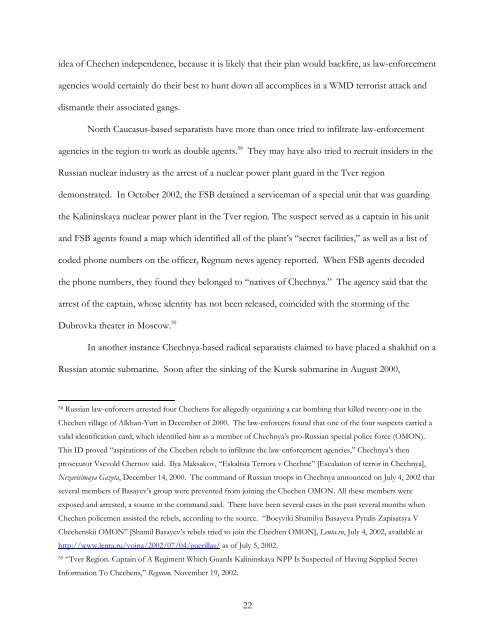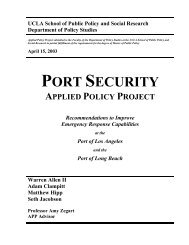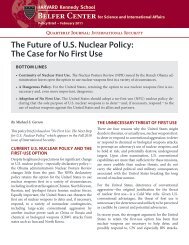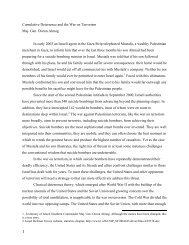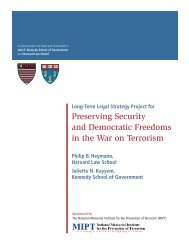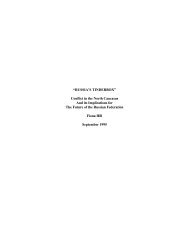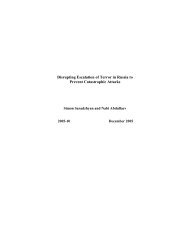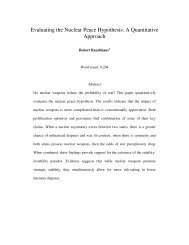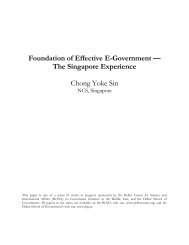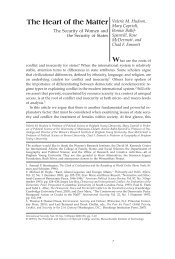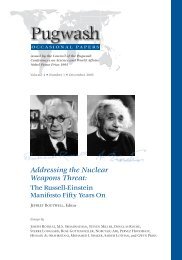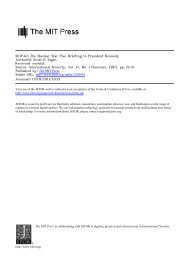Russia - Belfer Center for Science and International Affairs - Harvard ...
Russia - Belfer Center for Science and International Affairs - Harvard ...
Russia - Belfer Center for Science and International Affairs - Harvard ...
Create successful ePaper yourself
Turn your PDF publications into a flip-book with our unique Google optimized e-Paper software.
idea of Chechen independence, because it is likely that their plan would backfire, as law-en<strong>for</strong>cement<br />
agencies would certainly do their best to hunt down all accomplices in a WMD terrorist attack <strong>and</strong><br />
dismantle their associated gangs.<br />
North Caucasus-based separatists have more than once tried to infiltrate law-en<strong>for</strong>cement<br />
agencies in the region to work as double agents. 58 They may have also tried to recruit insiders in the<br />
<strong>Russia</strong>n nuclear industry as the arrest of a nuclear power plant guard in the Tver region<br />
demonstrated. In October 2002, the FSB detained a serviceman of a special unit that was guarding<br />
the Kalininskaya nuclear power plant in the Tver region. The suspect served as a captain in his unit<br />
<strong>and</strong> FSB agents found a map which identified all of the plant’s “secret facilities,” as well as a list of<br />
coded phone numbers on the officer, Regnum news agency reported. When FSB agents decoded<br />
the phone numbers, they found they belonged to “natives of Chechnya.” The agency said that the<br />
arrest of the captain, whose identity has not been released, coincided with the storming of the<br />
Dubrovka theater in Moscow. 59<br />
In another instance Chechnya-based radical separatists claimed to have placed a shakhid on a<br />
<strong>Russia</strong>n atomic submarine. Soon after the sinking of the Kursk submarine in August 2000,<br />
58 <strong>Russia</strong>n law-en<strong>for</strong>cers arrested four Chechens <strong>for</strong> allegedly organizing a car bombing that killed twenty-one in the<br />
Chechen village of Alkhan-Yurt in December of 2000. The law-en<strong>for</strong>cers found that one of the four suspects carried a<br />
valid identification card, which identified him as a member of Chechnya’s pro-<strong>Russia</strong>n special police <strong>for</strong>ce (OMON).<br />
This ID proved “aspirations of the Chechen rebels to infiltrate the law-en<strong>for</strong>cement agencies,” Chechnya’s then<br />
prosecutor Vsevold Chernov said. Ilya Maksakov, “Eskaltsia Terrora v Chechne” [Escalation of terror in Chechnya],<br />
Nezavisimaya Gazeta, December 14, 2000. The comm<strong>and</strong> of <strong>Russia</strong>n troops in Chechnya announced on July 4, 2002 that<br />
several members of Basayev’s group were prevented from joining the Chechen OMON. All these members were<br />
exposed <strong>and</strong> arrested, a source in the comm<strong>and</strong> said. There have been several cases in the past several months when<br />
Chechen policemen assisted the rebels, according to the source. “Boeyviki Shamilya Basayeva Pytalis Zapisatsya V<br />
Chechenskii OMON” [Shamil Basayev’s rebels tried to join the Chechen OMON], Lenta.ru, July 4, 2002, available at<br />
http://www.lenta.ru/vojna/2002/07/04/guerillas/ as of July 5, 2002.<br />
59 “Tver Region. Captain of A Regiment Which Guards Kalininskaya NPP Is Suspected of Having Supplied Secret<br />
In<strong>for</strong>mation To Chechens,” Regnum, November 19, 2002.<br />
22


